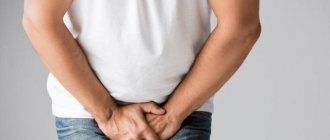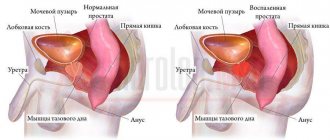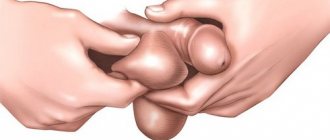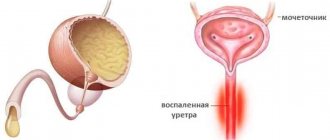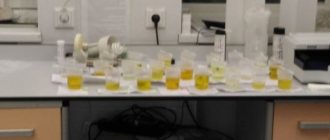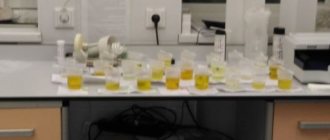Pain during or after urination in men is triggered by the presence of inflammation in organs related to the urinary and reproductive systems. So inflammation can affect:
- kidneys;
- bladder;
- urethra;
- internal genital organs.
Soreness varies in strength and nature. For example, it can manifest itself in the form of burning, stinging, itching, or simply nagging pain. The development of such a process can be caused by the presence of:
- yeast type fungi;
- Klebsiella;
- enterococci;
- coli and others.
Intoxication
Discomfort in the lower abdomen in men is often observed due to poisoning from spoiled food or questionable drinks.
Painful sensations can occur due to the consumption of excessive amounts of alcohol and exposure to harmful chemical compounds. Intoxication is characterized by such symptoms as a feeling of weakness, frequent and loose stools, attacks of nausea and vomiting. Poisoning requires complex therapy. Treatment includes cleansing the gastrointestinal tract and using adsorbents, such as activated carbon. In case of serious intoxication, the doctor prescribes antibiotics and medications to the patient to promote the proliferation of beneficial bacteria in the intestines.
Disorders of the urinary organs
Aching pain in the lower abdomen in men often occurs due to inflammatory processes in the kidneys or cystitis.
Sometimes illnesses of this kind have a chronic course and do not make themselves felt for a long time. However, the acute phase of pathologies is accompanied by pronounced symptoms. The man has a fever, chills, and a feeling of weakness.
Exposure to excessively low temperatures or hypothermia of the feet can lead to a deterioration in health and the development of an inflammatory process.
There are several common pathologies of the urinary system. These include:
- Stone formation.
- Cystitis.
- Inflammatory process in the area of the kidneys and urethra.
- Malignant tumors of the urinary organs.
Pyelonephritis
Why does the lower abdomen ache in men? Pyelonephritis is a common disease that occurs as a result of infection. It is an inflammatory process in the kidney area, often affecting men over the age of 60 who suffer from prostate adenoma.
The disease is accompanied by a feeling of nausea, bouts of vomiting, weakness, headache, loss of appetite and fever. The urine becomes cloudy, and the process of its excretion causes discomfort in the patient.
Reproductive system disorders
Pathologies of the genital organs are often an explanation for why the right side in the lower abdomen ache in men. Diseases affecting the prostate gland and penis can cause discomfort in this part of the abdominal cavity. Disorders of the reproductive system include:
- Acute inflammatory process in the prostate area. It is accompanied by discomfort when urinating, sharp pain in the lower abdomen, a feeling of nausea, high fever and inability to have sexual intercourse.
- Chronic type of prostate disease. The pathology causes unpleasant sensations of aching or pulling nature, which occur not only in the peritoneum, but also in the hypochondrium area.
- Inflammatory process in the testicles. The functioning of the gonads can be disrupted as a result of various infections (flu, mumps, gonorrhea). Pathology is also provoked by mechanical damage and exposure to excessively low temperatures. With this disease, the right side hurts or the left side in the lower abdomen ache.
This disease is dangerous. Advanced inflammation can lead to the formation of an abscess in the gonad area. This complication requires urgent surgical intervention. Therefore, if there are signs of pathology, you should promptly consult a doctor.
- Torsion of the gonad. This phenomenon leads to disruption of the blood supply to the organ. It is accompanied by severe discomfort, fever, swelling and a change in the shade of the skin in the testicular area (they become bright red or bluish). The pathology is often found in individuals with neoplasms in the peritoneum, inguinal hernias, and mechanical damage to the genitals.
- Infections of the reproductive system (STDs, tuberculosis, funiculitis).
- Inflammatory processes in the seminal vesicles.
- Neoplasms in the genital organs that are benign or malignant.
- Varicocele is an increase in the volume of veins in the ovarian area.
- Formation of stones in the prostate.
- Infectious diseases of the head and foreskin of the penis caused by various microorganisms.
- Inflammation of the corpus cavernosum.
Cramping and burning in the lower abdomen in men - causes and why it is dangerous
Often men experience burning and cramping in the lower abdomen. In order to find out what caused their appearance, you need to seek professional help from a doctor who, after carrying out the necessary diagnostic measures, can make the correct diagnosis and prescribe the necessary treatment.
Burning and cramping in the lower abdomen in males may be the first signs of infectious diseases, sexually transmitted diseases, as well as inflammatory processes in the prostate gland or bladder.
Representatives of the stronger half of the planet very often delay a visit to a specialist, as they are embarrassed by the intimate problems that have arisen. They often self-medicate and resort to traditional methods of treatment, which leads to aggravation of the situation; the disease often becomes chronic and leaves its mark on a man’s life in the form of various undesirable complications and consequences.
Reasons and what it could be
Burning and cramping in the lower abdomen can be harbingers of various diseases, the main ones include:
- Sexually transmitted diseases such as chlamydia, syphilis, gonorrhea. Their first symptoms often appear within 48 hours after infection. Sexually transmitted diseases are also characterized by skin rashes in the intimate area, problems with urination and pain during this process; patients often experience pain and discomfort during sexual intercourse with a woman. If you discover the above symptoms, you should consult a urologist. Venereal diseases require immediate professional treatment. Traditional methods are aimed only at reducing symptoms, but cannot rid the body of the true causes of the disease.
- Inflammation of the prostate gland occurs for various reasons, it can be a previous sexually transmitted disease, hypothermia, genetic predisposition, weak immune system, excessive stress, and so on. In this case, representatives of the stronger sex, in addition to burning and stinging, experience a lot of other unpleasant symptoms, for example: they experience a feeling of discomfort during sexual intercourse, they have problems with erection, patients are characterized by a frequent urge to urinate, which is often accompanied by pain . Prostatitis most often occurs in mature men.
- Diseases associated with the reproductive system , such diseases, for example, include vesiculitis, which is an inflammation of the seminal vesicles. In this case, the production of seminal fluid is disrupted, and the man experiences severe pain in the lower abdomen, which intensifies during sexual intercourse. If left untreated, the disease can lead to the formation of an abscess of the seminal vesicle and further treatment with surgical intervention, including amputation. Orchitis is an inflammatory process in the testicles, in this case the pain radiates to the sacrum and lower back.
- Cystitis is an inflammation of the bladder. Men are much less susceptible to the disease than women. This is due to the peculiarities of the anatomical structure. The urethra of the stronger sex is much longer, so pathogenic microorganisms have problems getting into the bladder. The disease is also characterized by an increase in temperature, the color and smell of urine changes, and patients experience the urge to urinate every 20-30 minutes.
- Venereal diseases are dangerous because in some cases they can lead to infertility and impotence.
- Prostatitis can develop into a chronic form, and patients also have an increased risk of developing cancer affecting the prostate gland.
- Diseases associated with reproductive function, if not properly treated, can lead to impotence and infertility.
- Cystitis can develop into enuresis (bedwetting) and pyelonephritis.
Why is this dangerous?
If you experience pain and a burning sensation in the lower abdomen, you must consult a doctor and start treatment on time, otherwise there is a possibility of complications that depend on the type of disease that caused these symptoms:
Diagnostics
In order to make a correct diagnosis, the doctor must first collect an anamnesis. The specialist asks the patient about symptoms, recent sexual contacts with unfamiliar partners and without a condom. Next, the doctor, if necessary, prescribes further diagnostics, which may include:
- General blood analysis.
- Ultrasound examination of the prostate and abdominal organs.
- Analysis of urine.
- CT scan.
- Magnetic resonance imaging.
What to do?
If pain or burning occurs in the lower abdomen, it is recommended to immediately consult a doctor who can make the correct diagnosis and prescribe treatment. It is strictly forbidden to self-medicate and resort to traditional methods of therapy without first consulting with your doctor. During the therapeutic course you should:
By following all these rules, you can avoid the occurrence of pathology.
Loading…
Source: https://KardioBit.ru/pochki/rezi-i-zhzhenie-vnizu-zhivota-u-muzhchin-prichiny-i-chem-eto-opasno
Etiology
Clinicians know many causes of pain in the lower abdomen: all causes are divided into several categories.
The first is represented by diseases that negatively affect the gastrointestinal tract:
- intestinal obstruction;
- inguinal hernias;
- Crohn's disease;
- nonspecific ulcerative colitis;
- oncological or benign tumors of the gastrointestinal tract, in particular in the large intestine;
- irritable bowel syndrome;
- acute inflammation of the cecal appendage;
- diverticulosis and intestinal dysbiosis;
- chronic constipation;
- sigmoiditis;
- polyposis;
- gastritis of any nature;
- gastroduodenitis;
- ileitis;
- inflammatory process in the pancreas;
- ulcerative lesion of the stomach.
Stomach ulcer in men
The second most common cause is pathological causes involving the genitourinary system. In such situations, the occurrence of pain is provoked by the following factors:
- inflammation of the prostate gland;
- priapism - acute pain in the lower abdomen caused by prolonged erection;
- adenoma and prostate cancer;
- pyelonephritis and cystitis;
- an inflammatory process in the testicles, which is medically known as orchitis;
- renal colic caused by urolithiasis;
- inflammatory lesion of the penis;
- vesiculitis and epididymitis;
- urethritis;
- cavernitis and colliculitis;
- inflammatory or oncological lesions of the bladder;
- balanitis and fasting;
- varicocele or testicular hydrocele;
- testicular torsion.
Less common predisposing factors that cause lower abdominal pain in men include:
- disruption of the functioning of the endocrine system (adrenal glands, pituitary gland and thyroid gland);
- cystitis;
- radiculitis;
- STD;
- kidney disease;
- infarction or volvulus of the spleen;
- intervertebral disc herniation.
Cutting pain, in addition to the indicated pathological provocateurs, can be caused by the prolonged influence of such physiological sources:
- lack of physical activity;
- addiction to bad habits, for example, drinking alcoholic beverages in large quantities;
- hypothermia of the body;
- lack of diet;
- presence of obesity;
- interrupted sexual intercourse;
- hormonal imbalance;
- failure of the immune system.
Symptoms
Regardless of the cause of pain in the lower abdomen in a man, discomfort always acts as the first, but not the only clinical manifestation.
The symptomatic picture may include a large number of signs characteristic of the underlying disease, which is why the complaints of each patient will be strictly individual.
There is a group of symptoms that develop most often.
Additional clinical manifestations:
- bloating;
- increased gas formation;
- frequent urge to urinate - some may be false;
- nausea ending in vomiting - vomiting does not always bring relief;
- temperature increase;
- fluctuations in blood tone indicators;
- disruption of the bowel movement process - constipation and diarrhea, their alternation;
- the presence of pathological impurities in feces, urine and vomit;
- premature ejaculation;
- erectile disfunction;
- decreased physical activity and mental performance;
- aversion to food;
- irritability and weakness;
- tendency to depression;
- itching and burning in the anal area;
- irradiation of pain - more often the pain spreads to the lower limbs, scrotum and groin area, the entire anterior wall of the abdominal cavity and lower back;
- profuse sweating;
- headaches and dizziness;
- causeless weight loss;
- pain when urinating;
- decreased duration of sexual intercourse;
- chills and belching;
- discharge from the urethra;
- heartburn and hiccups;
- pale skin;
- infertility.
The main symptom can be either constant or periodic. Increased pain is most often observed at night, during or after eating food, during sexual intercourse and visiting the toilet.
All external signs that may be accompanied by aching pain in the lower abdomen should be attributed to males of any age category.
Other reasons
Pain in the groin area can also be caused by:
- Inguinal hernia. In this disease, due to a defect in the abdominal muscles, a section of the intestine prolapses into the inguinal canal in the form of a pouch-shaped diverticulum (loop). In men, the symptoms of an inguinal hernia are nagging pain at the site of diverticulum formation. Upon examination, the hernial protrusion can be seen; it increases with the vertical position of the body.
Important! If the hernia is large, it may become strangulated, and the pain syndrome increases sharply. The blood supply to the pinched area of the intestine is disrupted, and its tissues may become necrotic, which can lead to the development of peritonitis. In such a situation, emergency surgery is indicated.
- Appendicitis. All known signs of inflammation of the appendix are attacks of colic that cover the right side of the groin. They can radiate to the leg or perineum; palpation reveals tension in the peritoneal muscles. An acute attack of appendicitis is often accompanied by nausea, stool retention, and low-grade fever.
- Tumors in the pelvic area. The phenomenon of synalgia, when pain radiates to other areas of the body, in particular the groin and perineum, is typical for most neoplasms localized in the pelvic area. The source of the pain signal in such cases is identified during examination using laboratory and instrumental methods.
- Varicose veins Pain in the groin can be caused by pathologies of the valves of the veins located in the perineum. In particular, this is how varicocele manifests itself - varicose veins of the vessels of the spermatic cord.
- Injuries . When the muscles or tendons of the groin are damaged, pain usually occurs when moving. There may also be slight inflammation or swelling of the soft tissue.
- Pathologies of the musculoskeletal system. People with diseases of the skeletal system often complain of discomfort in the groin. With osteochondrosis, arthritis or coxarthrosis, compression of the nerve fibers occurs, some of which extend to the lower edge of the peritoneum.
- Inflammation of the lymph nodes. Enlarged lymph nodes located in this area can cause pain in the lower abdomen. Catarrhal phenomena in the lymph nodes can develop due to diseases of the internal organs, as well as as a result of infection or injury.
Treatment
The tactics of neutralizing pain syndrome are conservative. Treatment of discomfort involves taking medications:
- antibacterial substances - in cases of any inflammatory process;
- analgesics and antispasmodics;
- non-steroidal anti-inflammatory drugs;
- immunomodulators;
- prebiotics and probiotics;
- mineral and vitamin complexes.
Severe pain in the lower abdomen in men can be eliminated using physiotherapeutic procedures:
- ultrasound;
- medicinal electrophoresis;
- warming up;
- acupuncture;
- magnetic therapy;
- diadynamic therapy;
- darsonvalization;
- inductothermy;
- UHF.
Conservative treatment may include:
- diet therapy - a gentle menu is compiled only by the attending physician;
- massotherapy;
- folk remedies - used only after consultation with a clinician;
- Exercise therapy.
All methods will help relieve pain, but do not affect the treatment of the underlying disease. To eliminate the disease that caused the pain, both conservative methods and surgical intervention may be required.
If stabbing pain appears in the lower abdomen in men, indications for surgery are:
- testicular torsion;
- neoplasms of any nature;
- appendicitis;
- varicocele;
- cholelithiasis.
Prevention and prognosis
To avoid pain in the lower abdomen in men, you just need to follow general simple preventive rules:
Source: https://sakhbmc.ru/simptomy/rezi-vnizu-zhivota-u-muzhchin.html
Disorders of the digestive system
Normal functioning of the gastrointestinal tract is necessary to maintain the health of any person. If the functions of the stomach or intestines are impaired, the individual experiences characteristic symptoms. Discomfort in the lower abdomen in men is often a consequence of the following pathologies:
- Crohn's disease.
- Inflammatory process in the appendix.
- Colitis.
- Intestinal obstruction.
- Hernia.
- Malignant neoplasms of the gastrointestinal tract.
- Chronic stool retention.
- Deformation of the colon.
Inflammatory process in the appendix
This disease is called appendicitis. With this disease, discomfort in the lower right abdomen in men is common.
The vermiform appendix of the cecum can become inflamed under the influence of the following factors:
- The presence of gastrointestinal pathologies that are chronic.
- Prolonged stool retention.
- Infectious diseases (tuberculosis, typhoid).
- Mechanical damage to the peritoneum.
- Deformations of the appendix.
- Clogged appendix with sunflower seed peels and grape seeds.
The inflammatory process in this organ is accompanied by discomfort in the lower part of the peritoneum, attacks of nausea and vomiting, tension in the abdominal muscles, stool retention or diarrhea, and fever. This disease requires urgent medical attention.
Which doctor should I contact?
First of all, a man should consult a dermatologist, since pathology is often associated with damage to the skin. Once the cause is identified and after a thorough examination, treatment is prescribed.
If the burning sensation in the groin area is associated with sexually transmitted infections, then you will need to consult a venereologist. Renal pathologies that cause secondary burning of the skin are treated by a urologist, and gastrointestinal diseases fall under the purview of a gastroenterologist.
Source: ManExpert.ru
Intestinal disorders
This is, first of all, obstruction. This condition is characterized by blockage of the organ with the contents of the gastrointestinal tract. It develops under the influence of the following factors:
- The presence of neoplasms or adhesions, stones, or foreign objects.
- A disorder of intestinal motor functions, which is explained by excessive consumption of food after prolonged hunger, eating high-calorie foods.
- Inflammatory processes in the appendix or pancreas.
- Taking painkillers or anesthetics.
The disease is accompanied by discomfort, attacks of vomiting, the inability to pass feces and gases, and an increase in the size of the peritoneum.
Aching pain in the lower abdomen in men is also a symptom of a neoplasm in the intestinal area. The tumor can be either malignant or benign. If it reaches large volumes, this condition is dangerous. The patient has a risk of rupture of the gastrointestinal tract and the development of an acute inflammatory process in the peritoneum. Aching pain in the left lower abdomen in men also often indicates the presence of pathology of the sigmoid colon or diverticulosis.
Symptoms of diseases of the lower abdomen
To find out which doctor to contact for medical help, it is necessary to determine all tangible deviations in the body’s functioning and the presence of discomfort in the area where the organs are located.
As a result of such anamnesis collection, 90% of the causes of this symptom can be determined. But such diagnostics are prohibited in case of acute and prolonged pain, and you should immediately call an ambulance or go to the surgical department of the Central District Hospital.
In order to conduct a quick self-diagnosis, you just need to compare the pain and symptoms with the following diseases:
- Constipation and bloating . In most cases, constipation and bloating occur when the upper intestines are disrupted or when heavy and poorly digestible foods are consumed. Colic and spasms appear, which occur when the walls expand with gases and feces.
- Dysbacteriosis . It develops as an independent disease or as a result of taking antibiotics. Fungi, pathogenic and conditionally pathogenic microorganisms irritate the intestinal walls, thereby causing colic and discomfort in the lower abdomen in men. Depending on the type of microorganism and health status, symptoms increase over several days.
- Worm infestation . Painful sensations appear after irritation of the mucous membrane by worms. Depending on the type of parasite, the pain can be bursting, acute, short-term or long-lasting with spread throughout the intestine.
- Damage . The causes of pain can be injuries and acute pathologies of internal organs, subsequently developing violations of the integrity of their structures. As a result, acute, prolonged pain or periodic attacks appear with increasing intensity and strength of sensations.
- Peritonitis . Subsequently, a violation of the integrity of the structures of hollow internal organs and the outpouring of foreign contents into the abdominal cavity develop. The disease begins acutely with an increase in symptoms. Depending on the location of the damage and the nature of the contents, the first signs can appear anywhere in the intestine and spread quickly.
- Neuritis of the sciatic nerve . It is characterized by the development of an inflammatory process of the sciatic nerve as a result of intervertebral compression or traumatic damage to the structure of the nerve fibers. Depending on the location and degree of damage, pain spreads to different innervated areas - the thigh, right or left iliac region and lower abdomen.
- Spinal injuries . Spinal injuries lead to pinching of the roots of peripheral nerve fibers and inflammation with pain and tunnel syndrome, paresis or paralysis of the innervated surface. Injuries to the lumbar spine often lead to pain in the right or left iliac region radiating to the leg.
- Abdominal injuries . Subsequently, traumatic effects lead to the formation of bruises of organs, violations of their integrity and hematomas. As a result, pain of a different nature appears depending on the degree and location of the damage.
- Diseases of the urinary system . It is characterized by inflammatory processes of the urinary system, subsequently exposed to bacteria or fungi. It manifests itself as colic in the kidneys and lower back, radiating to the bladder and down the abdomen. Inflammation of the bladder is manifested by pain in the lower abdomen, which intensifies when it is 10% full and during urination.
- Vesiculitis, testicular torsion and orchitis . They manifest as pain in the groin area with irradiation to the lower extremities, pelvic organs and down the abdomen. Sometimes the sensations become unbearable and require the administration of painkillers. Irradiation to the sacrum often occurs during urination or defecation. With orchitis and testicular torsion, swelling of the scrotum occurs with constant pain.
- Acute intestinal obstruction . It develops as a result of intestinal blockage with feces, foreign bodies and adhesive septa. The intestinal lumen is blocked and its functioning stops.
- Neoplasms and oncology . Under the influence of environmental factors or genetic predisposition, tumors appear in the pelvic cavity. Depending on the characteristics of their structure, location and degree of damage to internal organs, they cause pain and discomfort.
- Appendicitis . The cause of pain is an inflamed appendix. The disease develops acutely or gradually, with an increase in symptoms subsequently of circulatory disorders, damage to the mucous membrane by a bacterial infection or blockage of the lumen of the appendix. Depending on the characteristics of a man’s body, pain at the beginning of the inflammatory process can appear in any part of the abdominal cavity. Gradually, acute pain concentrates in the right iliac region.
- Prostatitis . Inflammation of the prostate gland, which occurs in men over 35 years of age, due to impaired blood circulation and an increase in the size of the prostate. Such inflammations are caused by a bacterial infection that enters the gland through the blood and the ascending tract of the urinary system. Initially, discomfort is felt when urinating, which gradually turns into cutting sharp pain in the lower part of the abdominal cavity. A distinctive symptom is an increase in temperature, pain in the rectum during bowel movements, and false urges with an empty bladder. If the disease is not treated, after some time problems with urination and acute urinary retention appear.
- Haemorrhoids . Subsequently, the dilation of the vessels of the rectum forms nodes. After some time, they become inflamed and cause discomfort in the anus with pain radiating to the suprapubic region. A distinctive symptom is the appearance of blood streaks on the surface of the stool and increasing discomfort in the anus.
- Hernia . As a result of lifting weights, a bulge may appear in the right or left iliac region, which becomes more painful every minute. Unpleasant sensations intensify and spread as the intestinal loops are pinched. In case of such phenomena, you should immediately seek medical help.
Unpleasant sensations during or after intimate contact
Sometimes representatives of the stronger sex notice that sex begins to cause them discomfort. How can such a phenomenon be explained?
If there is pain in the left lower abdomen in men after intimate contact, the reason often lies in pathologies of the reproductive system. These include the inflammatory process in the prostate gland, a benign neoplasm in this organ. In some cases, the malaise is explained by infections that are transmitted during sex. These are diseases such as chlamydia and gonorrhea. Patients with similar diseases notice the discharge of pus or cloudy fluid from the urethra, rashes and sores on the surface of the penis. In addition, infections are accompanied by discomfort in the lower abdomen in men and a burning sensation. If a couple uses condoms or spermicides to protect against conception, symptoms may be due to individual intolerance to the ingredients contained in these products.
Diagnosis of diseases
If a burning sensation occurs in the intimate area in men, then it is necessary to pay attention to the accompanying symptoms, which will facilitate the diagnosis of the pathology. Thus, burning is often accompanied by the following symptoms:
- hyperemia of the skin (the skin turns red due to inflammation or scratching);
- Often, rashes appear in the intimate area in the form of bright red dots (this is either a rash that accompanies infectious diseases, or hemorrhages due to mechanical stress);
- severe itching in the groin area;
- cracks on the surface of the skin and ulcers (usually they appear as a result of long-term untreated irritation and inflammation);
- decreased performance, poor sleep and irritability often arise due to the constant discomfort that a man feels;
- discharge from the urethra.
Ways to provide assistance
How to understand that pain is associated with an emergency condition? This can be judged by the presence of the following signs:
- Acute discomfort that lasts more than 60 minutes and is accompanied by tension in the abdominal muscles.
- Increased discomfort when moving, coughing.
- Disruption of the process of excretion of feces and gastric contents.
- Presence of blood in the stool.
- Pale coloration of the skin, profuse cold sweat, increased heart rate.
- Decrease in blood pressure readings.
- Nausea and repeated bouts of vomiting.
- Severe discomfort in the left lower abdomen in men, which is accompanied by difficulty in urinating or urine retention.
- Violation of the breathing process.
- Loss of consciousness.
In such situations, it is necessary to call an ambulance service. The patient should take a lying position, place a lotion or a heating pad with cold water on the peritoneal area for about 30 minutes. The patient should not be given medications until medical workers arrive. Consumption of food and liquid is also undesirable. If you are very thirsty, you can lightly moisten the lip area.
If you experience pain when urinating
The importance of contacting specialists as early as possible if any unpleasant symptoms (and especially painful emptying of the bladder) occurs is obvious. However, if pain during urination is accompanied by pain of a different kind - in the lower back and genitals - a trip to the doctor becomes vital. It is especially important to strictly refrain from self-medication - a categorical ban on independent choice of treatment is justified by the danger that it poses to the life and health of “patients”.
After the first signs of disruption of the delicate male genitourinary system appear, you should make an appointment with a doctor - a urologist, andrologist or venereologist. Only a specialist will be able to identify the main cause of pain when urinating by conducting a series of examinations, starting with a survey. The doctor will take into account everything: the nature of the pain, its duration, frequency, the presence or absence of blood in the urine and discharge from the bladder. Only then will the optimal – and safe – treatment be prescribed.
In fact, it is quite difficult to imagine that someone can experience pain when urinating for several days in a row (especially if the urge to urinate has become more frequent up to 10-15 times a day) and not worry about the state of their health. This condition is not just unpleasant - it is painful to such an extent that you want to curl up into a ball and not move. But it’s also scary - not knowing what exactly went wrong in your own, beloved and only organism. To find out, you should visit a doctor.
Medical events
After the patient contacts a medical institution, he is prescribed diagnostic procedures. These include laboratory tests of biological material (urine, blood, taking a smear from the urethra), as well as other methods of assessing the condition (ultrasound of the reproductive system, abdominal organs, FGDS, colonoscopy, x-rays). Treatment methods depend on the results of the examinations. They may involve taking medications. These are, for example, drugs to combat harmful microorganisms (“Cefaclor”, “Cefuroxime”, “Amoxiclav”), drugs to eliminate spasms (“No-shpa”, “Papaverine”), tablets that relieve inflammation (“Ibuprofen”, “ Nimesulide"). With the development of acute pathologies (appendicitis, torsion of the gonad), the patient requires surgical intervention. In case of problems with the reproductive system, physiotherapy is often used. A proper diet is of no small importance for a number of diseases. For example, if stones form in the urinary organs, it is necessary to limit the consumption of salt, smoked foods, baked goods, and drinks containing ethanol and caffeine. Bran, fruits, dairy products (kefir, cottage cheese) are recommended.
Patients with intestinal pathologies should avoid confectionery, chocolate, hot sauces and seasonings, fatty foods, and fried foods. Dishes made from lean meat or fish (meatballs, soufflés, cutlets), fruits and vegetables, pureed, steamed or baked in the oven, and cereals with a soft, slimy structure (for example, oatmeal) are allowed. A proper diet and medication improve the functioning of the gastrointestinal tract and the general condition of the patient.

